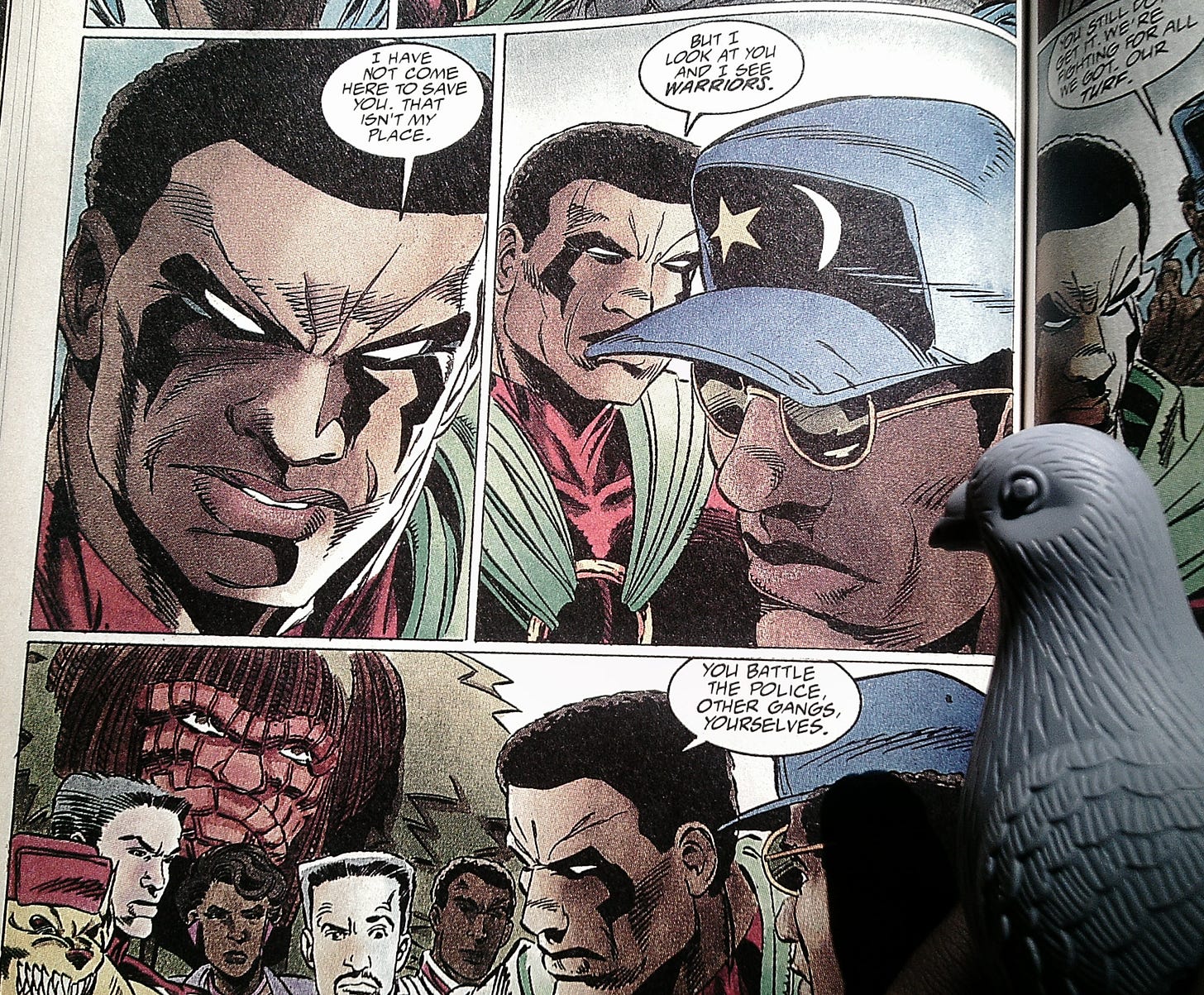The "Super-" writer whose Icon a SCOTUS justice may have quoted -- sans context
On Dwayne McDuffie

By D. Menzies
After listening to someone talk about the Bruce Timm-produced “Justice League” animated series as an example of something with superheroes they found more interesting than the recent “Superman” movie, I was reminded of Dwayne McDuffie — co-creator of the Milestone comics universe and writer of dozens of episodes of “Justice League” and sequel series “Justice League Unlimited” along with some feature-length DC animated films.
Milestone’s creators were primarily Black writers and artists trying to create the kind of substantive representation they’d been yearning for.
Their comic universe has been called the “Dakotaverse,” as it mostly revolved around the fictional city of Dakota. The most famous of these would be Static, who also had an animated series (“Static Shock”) and was also featured in the animated series “Young Justice” — along with Rocket, the protege of the character, Icon, who McDuffie co-created with artist M.D. Bright.
McDuffie died too young at 49 due to complications from emergency heart surgery. But his legacy lives on. Timm once said JLU was his favorite of the shows he worked on, and McDuffie was a huge part of the show.
An interesting footnote from his life is when he learned that Clarence Thomas was supposedly a fan of his work — or a fan one character, in particular, the aforementioned Icon.
Icon was sort of an answer to “What if Superman wasn’t ‘white’-appearing?"
“Sort of an answer to” because the character wasn’t just an inversion.
He crash lands on Earth as an adult alien; his pod’s tech gives him the form of an infant whose appearance is informed by who first touches his ship. This happens during the 19th century in the U.S., and the person who finds him is a Black, enslaved woman. Cut to the end of the 20th century, and this ageless alien, Augustus Freeman, who’s taken on the identity of his Earth persona’s own son every generation, is a successful lawyer with a conservative bent that gives Rush Limbaugh a run for his money (according to his white law firm partner); and his mansion is being robbed by a group of desperate, poor young people — one of whom, Raquel, will convince him that he can use the powers he displays in stopping them to help people … with her as his protege, the aforementioned Rocket.
An example that speaks to what McDuffie was trying to do with Icon and in comics in general is the character, “Buck Wild,” a parody of Luke Cage who replaces Icon’s superhero beat for a time.
The simple imagery of Buck Wild on a comic cover — a musclebound Black man in a somewhat ridiculous outfit bursting through chains speaks to the limited iconography Luke Cage was rooted in.
Icon, on the other hand, was more respectable on two different levels. A slightly more tasteful costume, perhaps. But also enmeshed in respectability politics a la a Booker T. Washington (it’s a little reductive to what Washington, even as a member of the Black elite, went through in his lifetime [1856-1915],but the gist is: “If we’re at our utmost and act as such, they’ll treat us that way.”)
To McDuffie, modern Black conservatives were both very rare … and “mostly … children of financial means who haven’t been smacked in the face with the reality of their situation quite yet. Trust me, in 20 years they’re going to grow into a bumper crop of scary radicals. Hell hath no fury like a neocon scorned,” he wrote in a blog post.
I include those last two sentences because, while it’s unclear to me if McDuffie definitely means Black conservatives become scary radicals” his “Hell hath no fury like a neocon scorned” seems more broadly astute.
But the thing about “Icon” is it’s a “privileged/super-powered” other-ed being’s journey from behind the high gates he’s managed to get behind after a few generations as an ageless Black man with Superman-level invulnerability.
In the panel above, Icon is talking to a group where everyone survived the “Big Bang,” the label for what happens at a gang riot in which police mistakenly (on their part, but not someone else’s) use tear gas they didn’t know was imbued with “Quantum Juice”; because of it, most of the people tear-gassed die. A few, however, gain abilities or do so undergoing radical transformations.
Icon speaks to the multifaceted challenges these survivors undergo … they face the worst of the people around them (like everyone else does, though not everyone faces concentrated redlining and scapegoating) … other gangs empowered by a flawed system — along with the worst in themselves and the system. Icon poses a question to them. Basically: “At the moment, you actually have the turf/space you’ve been fighting for. What are you going to make of it?”
In his blog post, McDuffie writes about a co-worker telling him how Thomas supposedly highlighted quotes from Icon he liked and quoted them in speeches.
Thomas had replaced a hero of McDuffie’s — Thurgood Marshall, who successfully argued Brown v. Education — and McDuffie, who described himself as being to the left of basically everyone, wrote of suffering from writer’s block -- fearing what words he might write Freeman/Icon saying that Thomas could utilize without the overall liberal context of the character’s journey.
Would it be the one pictured above (probably not), and if not that one, what might be one who Thomas, from what we know of the arcs of his beliefs, have highlighted specifically?


